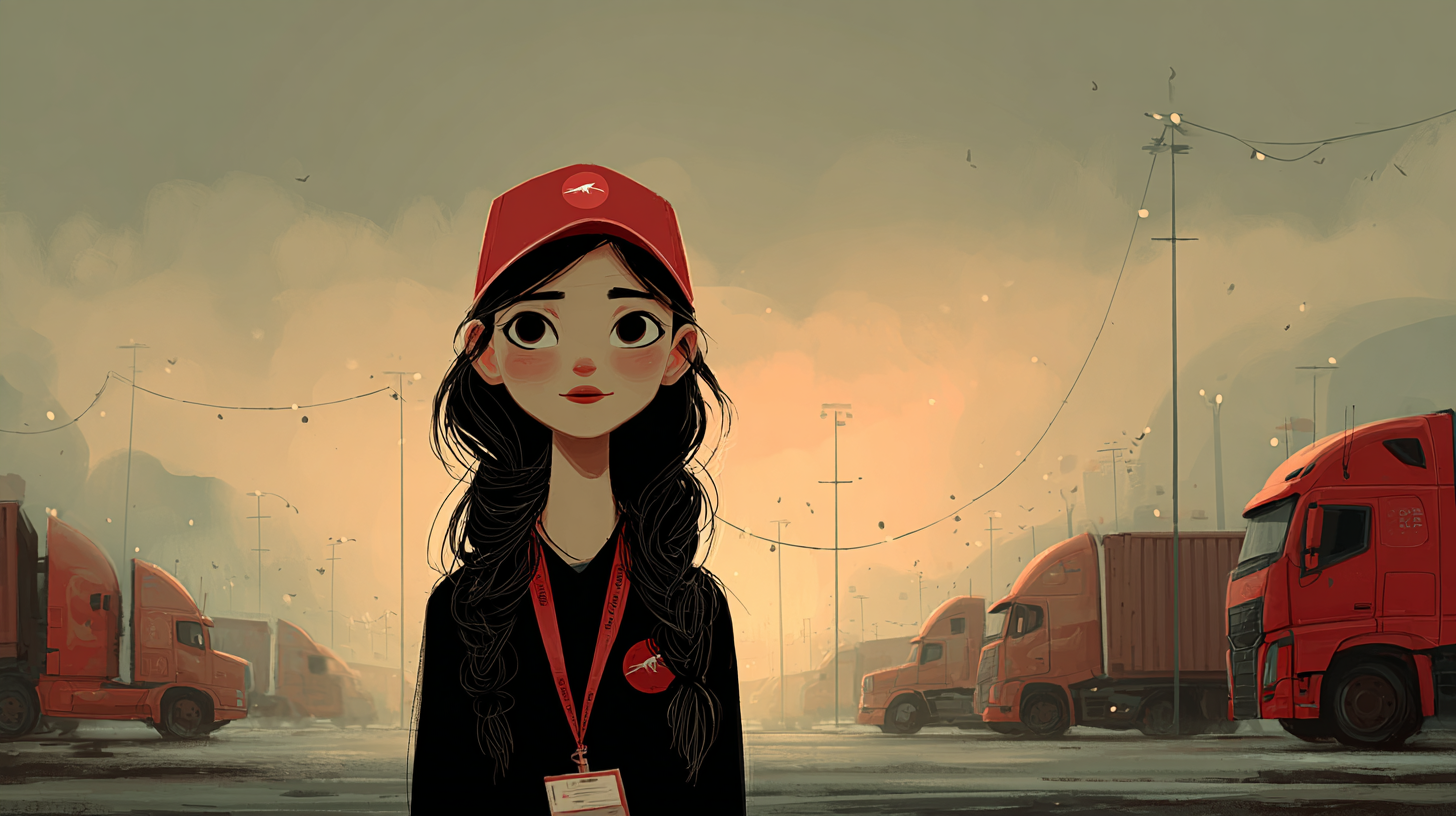“Chain” means something linked together, like a metal rope or connected things.
「chain」は「つながっているもの」や「鎖」のこと。
以下は英単語 “chain” に関するストーリー型学習コンテンツです。まずは大枠の意味を理解して最後の文章で確認しましょう。
主な意味(main meaning)
| 品詞 | 発音記号 | 意味 | 例文 |
|---|---|---|---|
| noun | /tʃeɪn/ | 鎖、連なり、束縛 | She wore a silver chain around her neck. |
| noun | /tʃeɪn/ | (店や会社の)チェーン、系列 | This restaurant is part of a famous chain. |
| verb | /tʃeɪn/ | 鎖でつなぐ、縛る | The dog was chained to a post. |
語源(etymology)
語源:ラテン語 catena(鎖、つながり)から。
核イメージ:「つながるもの」「一列につながる」
類義語(synonyms)
| 類義語 | 意味 | 例文 |
|---|---|---|
| link | つながり、輪 | Each link in the chain is strong. |
| series | 一連のもの | We watched a series of movies over the weekend. |
| sequence | 順番、連続 | The events happened in a sequence. |
| string | 紐、連なり | She wore a string of pearls. |
| network | ネットワーク、つながり | The company has a network of partners. |
反義語(antonyms)
| 反義語 | 意味 | 例文 |
|---|---|---|
| freedom | 自由 | The bird enjoyed its freedom after being released. |
| separation | 分離 | The separation of the two teams caused problems. |
コロケーション(collocations)
| コロケーション | 例文 |
|---|---|
| supply chain | The company improved its supply chain. |
| food chain | Lions are at the top of the food chain. |
| hotel chain | We stayed at a hotel chain in Paris. |
| chain reaction | The accident caused a chain reaction on the highway. |
| chain store | There is a new chain store near my house. |
2項表現(binomials)
| 2項表現 | 例文 |
|---|---|
| chain and lock | He used a chain and lock to secure the gate. |
| cause and effect | A cause and effect chain explains the problem. |
英語ストーリー(english story)
The Broken Chain
Emma had just started her new job at a logistics company. The company specialized in managing the supply chain for many businesses, from supermarkets to electronics stores. On her first day, her manager, Mr. Harris, explained, “Emma, our job is to make sure the chain of goods is never broken. If one link in the chain fails, the whole system suffers.”
Emma understood the importance of this. A supply chain was like a giant chain made of many parts: factories, trucks, ships, and stores. If one part was delayed, everything else would be delayed too.
One morning, Emma received an urgent call. A truck carrying fresh vegetables to a supermarket had broken down on the highway. The driver reported, “The accident caused a chain reaction. Several cars hit each other, and now traffic is blocked. The goods will be late.”
Emma quickly told Mr. Harris. He looked serious. “This is a problem. The supermarket depends on us. If they don’t get the vegetables, their customers will complain.”
Emma thought fast. “What if we call another truck from our network of partners?”
“That’s a good idea,” Mr. Harris replied. “Do it quickly.”
Emma called another transportation company. They agreed to send a truck immediately. The vegetables were transferred and finally reached the supermarket, just a little late.
That evening, Mr. Harris smiled. “Emma, you saved the day. If we had waited, the series of delays would have grown worse. You broke the bad sequence before it got too big.”
Emma felt proud. She had learned her first lesson: every small action matters in a big system.
A week later, Emma traveled for a business meeting at a large hotel chain. She checked in at the front desk, where the receptionist gave her a room key. But when she tried to open the door, it wouldn’t work. A chain and lock were on the door, preventing it from opening.
Emma went back to the front desk. “Excuse me, my room seems locked from the inside.”
The receptionist looked surprised. “Oh no, there must have been a mistake. That room is already occupied. Let me give you another key.”
Emma laughed. “It’s okay. At least the guest inside feels safe with the chain and lock.”
During the meeting, Emma gave a short presentation about the company’s food chain projects. She explained how different animals depend on each other and compared that to the way companies depend on partners. “Like a food chain, our business chain needs balance,” she said.
Her clients nodded. One of them said, “I like your example. It shows the cause and effect clearly. If farmers don’t produce enough, stores cannot sell enough, and customers suffer.”
By the end of the trip, Emma realized that the word chain appeared in many situations: in business, in nature, and even in everyday life. Sometimes, a chain meant something strong, like a string of pearls or a silver necklace. Sometimes, it meant a system, like a hotel chain or a supply chain. But she also understood that chains could represent limits, like when a dog was chained to a post, losing its freedom.
On her way home, she thought about Mr. Harris’s words: “If one link in the chain fails, the whole system suffers.” She now understood them better. Life itself was full of chains — of people, actions, and consequences. And the strongest chain was built with trust, responsibility, and cooperation.
和訳
壊れたチェーン
エマは物流会社で新しい仕事を始めたばかりだった。会社は、スーパーマーケットから電気店まで、多くのビジネスの**supply chain(供給網)**を管理していた。初日に上司のハリス氏は説明した。「エマ、私たちの仕事は商品のチェーンが決して切れないようにすることだ。**link(輪)**のひとつが壊れると、全体がダメになるんだ。」
エマはその重要性を理解した。supply chainは工場、トラック、船、店などから成る大きな**chain(鎖)**のようなものだった。ひとつが遅れると、すべてが遅れてしまうのだ。
ある朝、エマのところに緊急の電話が入った。新鮮な野菜をスーパーマーケットに運んでいたトラックが高速道路で故障したのだ。運転手は報告した。「事故が**chain reaction(連鎖反応)**を引き起こしました。数台の車がぶつかり、今は渋滞で動けません。商品は遅れます。」
エマはすぐにハリス氏に伝えた。彼は深刻な顔をした。「これは困ったな。スーパーは私たちに頼っている。もし野菜が届かなければ、客が不満を言うだろう。」
エマは素早く考えた。「私たちの**network(ネットワーク)**の他の会社にトラックを頼みましょう。」
「いい考えだ。すぐにやりなさい。」
エマは別の運送会社に連絡し、新しいトラックを手配した。野菜は積み替えられ、少し遅れて無事にスーパーに届いた。
その夜、ハリス氏は笑顔で言った。「エマ、君のおかげで救われた。もし待っていたら、遅れの**series(一連の出来事)はどんどん大きくなっていただろう。君は悪いsequence(連鎖)**を止めたんだ。」
エマは誇らしく感じた。大きなシステムの中では、小さな行動でも大きな意味を持つのだと学んだのだ。
一週間後、エマは大きな**hotel chain(ホテルチェーン)での会議のため出張した。フロントで鍵を受け取り、部屋のドアを開けようとしたが開かなかった。ドアにはchain and lock(鎖と鍵)**がかかっていたのだ。
エマはフロントに戻った。「すみません、部屋が中から施錠されているようです。」
受付係は驚いた。「なんと、間違いでした。その部屋にはすでにお客さまがいます。別の部屋をご用意します。」
エマは笑った。「大丈夫です。少なくとも中のお客さまはchain and lockで安心しているのですね。」
会議では、エマは会社の**food chain(食物連鎖)**プロジェクトについて発表した。動物が互いに依存していることを説明し、それを企業同士の関係にたとえた。「food chainのように、私たちのビジネスチェーンもバランスが必要です。」
顧客たちはうなずいた。ある人は言った。「その例えは分かりやすい。**cause and effect(原因と結果)**の関係がよく表れている。農家が十分に生産できなければ、店は十分に売れず、客が困るのだ。」
出張の終わりに、エマは「chain」という言葉が多くの場面で出てくることに気づいた。ビジネスでも、自然界でも、日常生活でもそうだった。string(ひもや連なり)のように美しいものを意味することもあれば、hotel chainやsupply chainのようにシステムを意味することもある。しかし犬が柱に**chained(つながれている)**ときのように、**freedom(自由)**を失う意味を持つこともある。
帰り道、エマはハリス氏の言葉を思い出した。「ひとつのlinkが壊れると、全体がダメになる。」その意味を彼女は今、より深く理解していた。人生そのものも、人、行動、結果がつながったchainなのだ。そして最も強いチェーンは、信頼、責任、協力でできているのだ。
Q&A
Q: 「chain」と「link」はどう違いますか?
A: 「chain」は全体の「鎖」や「つながり」を意味します。一方、「link」はその中の一つひとつの「輪」や「部分」を表します。つまり、linkが集まってchainになります。
Q: 「chain」と「series」はどう違いますか?
A: 「chain」は「物理的につながったもの」や「システムとしてのつながり」を強調します。「series」は「順番に並んでいる一連のもの」を表し、必ずしも物理的につながっているわけではありません。
Q: 「chain」と「sequence」はどう違いますか?
A: 「chain」は「ひとつの要素が次の要素に影響を与えてつながる」イメージがあります。「sequence」は単に「順序通りに並んだ流れ」を指します。因果関係がなくても使えます。
Q: 「chain」と「string」はどう違いますか?
A: 「chain」は金属の輪でできたものをイメージしますが、「string」は糸やひも状のもの、または軽く連なったもの(例:string of pearls=真珠の連なり)を表します。
Q: 「chain」と「network」はどう違いますか?
A: 「chain」は「直線的につながるもの」を表し、始まりと終わりがはっきりしています。「network」は「網の目のように広がる関係」を表し、より複雑なつながりを指します。
コロケーションとの違い
Q: 「chain」と「supply chain」の違いは?
A: 「chain」は一般的に「鎖」や「つながり」を表します。「supply chain」はビジネス用語で「原料から消費者に届くまでの一連の流れ」を表します。
Q: 「chain」と「food chain」の違いは?
A: 「chain」は一般的な「つながり」ですが、「food chain」は自然界で「動物や植物が食べる・食べられる関係」を示す専門用語です。
Q: 「chain」と「hotel chain」の違いは?
A: 「chain」は物理的な鎖などを指しますが、「hotel chain」は「同じブランドのホテルが世界や国内に系列として展開していること」を意味します。
Q: 「chain」と「chain reaction」の違いは?
A: 「chain」は「つながり」そのものを指します。「chain reaction」は「ひとつの出来事が次々に別の出来事を引き起こすこと」を表します。
Q: 「chain」と「chain store」の違いは?
A: 「chain」は「つながったもの」を意味します。「chain store」は「同じ名前やシステムを持つ系列店」のことを指し、コンビニやファーストフード店などによく使われます。



コメント